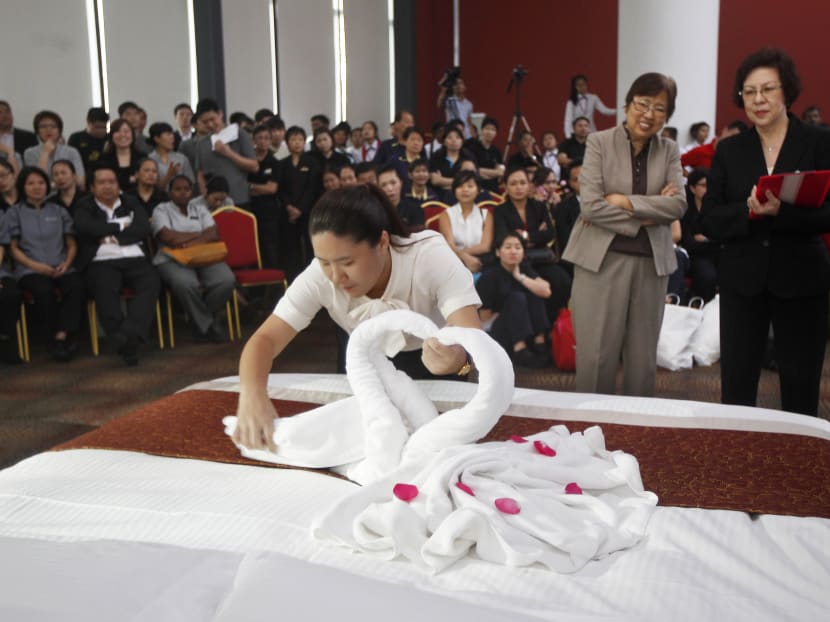Hotel industry gets boost with national plan to upgrade, retain workers
SINGAPORE — Long plagued by a manpower crunch, the hotel industry is getting a boost in the form of a government-led Sectoral Manpower Plan (SMP), which aims to better attract and retain Singaporeans, and groom talent for leadership roles.

A hotel housekeeping staff member making a bed during the Hotel Housekeeping Challenge 2014. The SMP will also seek to improve job quality and identify emerging skills needs for the hotel industry. TODAY file photo
SINGAPORE — Long plagued by a manpower crunch, the hotel industry is getting a boost in the form of a government-led Sectoral Manpower Plan (SMP), which aims to better attract and retain Singaporeans, and groom talent for leadership roles.
Unveiled today (Oct 9) as the first SMP launched under the national SkillsFuture programme, it also seeks to improve job quality, and identify emerging skills needs for the hotel industry. The plan will be implemented from now until 2020.
Initiatives include enhanced structured internships with a minimum stipend, the Earn and Learn programme — a government-supported work-study scheme — and study awards for those already working in the industry.
At the launch held at One Farrer Hotel and Spa, Manpower Minister Lim Swee Say warned that the industry faces a stark challenge. By 2018, room inventory figures are expected to grow by more than 20 per cent to 70,470, yet local manpower growth — especially at the rank-and-file level — will inevitably slow down. At the same time, more university graduates are entering the workforce, but only a third of hotel jobs are at leadership, managerial and executive levels.
“If we maintain that better service is only possible with more manpower, there will be no way out of the manpower bottleneck,” Mr Lim said. “The old model of manpower-led growth is no longer sustainable. Instead, we need to become more manpower-lean.”
Singaporeans form about 60 per cent of the hotel industry workforce, according to estimates given by the Singapore Hotel Association (SHA).
The SMP is about “deepening skills in the local workforce and developing good jobs for Singaporeans”, said the Singapore Workforce Development Agency (WDA), which is spearheading the initiative with the Singapore Tourism Board.
Already, more meaningful internships for polytechnic and Institute of Technical Education (ITE) students are under way.
Under the internships, which span at least 22 weeks, the student are given a minimum stipend of S$600. They will also be assigned mentors, and rotated to at least two departments, such as guest relations or housekeeping.
Currently, hotels have varying practices for internships. Stipends range from S$450 to S$1,000, and the duration is between 16 weeks and 24 weeks, said Republic Polytechnic’s deputy principal (academic services) Michael Koh. The polytechnic is the sector coordinator for hotel industry.
“We didn’t want the industry to be competing with each other (for talent), so we offered a baseline,” said Dr Koh. “It’s a good start. Everyone comes on the bandwagon to harmonise.”
The Earn and Learn Programme, which kicks off next year, has seen 32 hotels and two hotel chains pledge their support. Fresh polytechnic and ITE graduates will work and study concurrently, starting as trainees to become executives with supervisory responsibilities, and receive a specialist diploma in hospitality business management at the end of the one-year scheme. They will also be awarded S$5,000, while participating hotels will receive up to S$15,000 per trainee.
Other schemes include the Leadership Development Initiative — under which hotel employees earmarked for leadership roles will be given on-the-job training and networking and mentorship opportunities — and study awards of up to S$5,000. The former is still in the works, while the latter starts next year.
The final initiative is the Singapore Skills Framework, to be rolled out in the first half of 2016. It outlines career progression pathways — be it for someone working in the front desk to someone working in sales and marketing — so that people will not think of hotel jobs as a “dead end”, said Mr Christopher Yip, WDA’s deputy director for the tourism division.
Whether funding for the Earn and Learn programmes and the study awards will continue after 2020 remains to be decided.
Acknowledging that the SMP remains a guideline for hotels, Mr Yip said: “We cannot force (them). The incentive for the hotel to groom the person is the manpower crunch … If the hotels don’t do this, then they will lose out. And the hotels are not only competing for manpower among themselves, but also with the retail industry, the F&B industry and others. So if you don’t step up in terms of human resource practices and talent development programmes, then nobody will join you.”
SMPs will also be rolled out for the social services, early childhood care and education, healthcare, retail and food services, and biopharmaceutical sectors.






